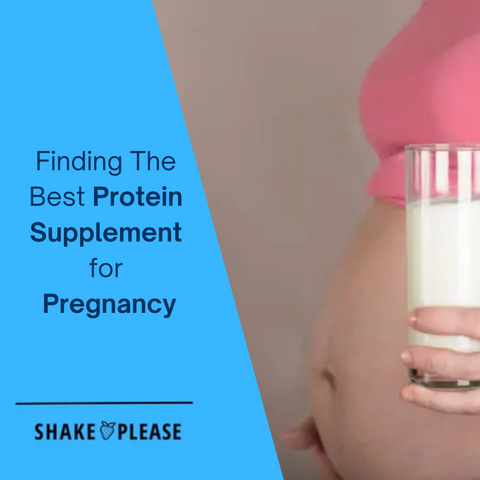
Pregnancy is a time of immense change, both physically and nutritionally. Among the most crucial nutrients needed during pregnancy is protein, which supports the health of both the mother and baby. Protein plays a key role in building and repairing muscles, producing essential hormones, and aiding in the baby’s growth and development. Yet, getting enough protein through regular meals can be challenging due to nausea, food aversions, or the exhaustion that pregnancy often brings. In such cases, protein supplements can offer an easy and convenient way to boost protein intake. This guide aims to help pregnant women navigate through the various options available and find the safest and most effective protein supplements for their needs.
Importance of Protein During Pregnancy
Protein is essential during pregnancy because it provides the building blocks for the baby’s development. It helps in the growth of the baby’s tissues, muscles, and organs and also supports the mother’s body as it undergoes significant changes.
Key Functions of Protein:
-
Muscle repair and growth: As the mother’s body expands to accommodate the baby, protein helps repair and grow muscle tissue.
-
Hormone production: Protein is vital for producing hormones that regulate pregnancy.
-
Fetal development: Protein supports the growth of the baby’s muscles, organs, skin, and tissues.
During the second and third trimesters, protein needs increase to support rapid fetal growth. Meeting these needs ensures the baby develops properly and minimizes the risk of complications such as low birth weight or preterm birth.
Protein Requirements for Pregnant Women
The recommended daily protein intake for pregnant women is about 60 grams per day, although this can vary depending on factors such as body weight, activity level, and whether the mother is carrying multiples.
To calculate the exact protein needs, pregnant women can use the following formula:
-
Multiply body weight (in kilograms) by 1.2 to 1.5 grams to determine daily protein requirements.
For example, a woman weighing 68 kilograms (150 pounds) would require between 80 and 100 grams of protein each day. This calculation is based on the increasing needs of the mother and baby, particularly as pregnancy progresses.
Challenges of Meeting Protein Needs
Many pregnant women find it difficult to meet their protein needs through food alone due to:
-
Morning sickness: Nausea and vomiting can make it hard to consume protein-rich foods like lean meats or eggs.
-
Food aversions: Pregnancy-related food aversions may make some high-protein foods unappealing.
-
Fatigue: Preparing protein-rich meals can feel like a burden when dealing with the physical exhaustion that pregnancy brings.
In such cases, protein supplements can be an easy way to ensure that the body gets enough protein without the need for meal preparation.
PREGNANCY HACK: HEALTHY SMOOTHIE DELIVERY FOR PREGNANT WOMEN
Benefits of Protein Powders During Pregnancy
For pregnant women, consuming protein powders can offer a range of benefits, especially during periods when eating enough food becomes difficult. These powders provide a concentrated source of protein that is easy to digest and quick to prepare.
Key Benefits of Protein Powders:
-
Supports fetal growth: Protein powders help ensure that the baby’s muscles, organs, and tissues grow properly.
-
Boosts maternal health: They help maintain the mother’s muscle mass and energy levels, supporting her overall health during pregnancy.
-
Convenience: Protein powders are easy to mix into shakes, smoothies, or snacks, making them a simple solution for busy or nauseated women.
-
Provides essential nutrients: Many protein powders are fortified with additional vitamins and minerals, supporting both mother and baby’s health.
Choosing the Right Protein Powder for Pregnancy
Choosing a protein powder while pregnant requires careful consideration to ensure that it is both safe and effective. Not all protein powders are created equal, and some may contain harmful additives or excessive sugars.
Factors to Consider:
-
Ingredient quality: Opt for protein powders with very few ingredients and avoid those containing artificial sweeteners or additives like xanthan gum.
-
Third-party testing: Since protein powders fall under the category of dietary supplements and are not regulated by the FDA, choose a product that has been third-party tested for safety.
-
Low sugar content: Avoid protein powders with high sugar content or artificial sweeteners. Look for options sweetened with natural alternatives like monk fruit.
-
Nutritional profile: Ensure the powder provides at least 20-30 grams of protein per serving and contains other essential nutrients.
Types of Protein Powders for Pregnancy
There are several types of protein powders available, and each type has its benefits and considerations for pregnant women.
-
Whey Protein for Pregnancy
Whey protein is derived from milk and is considered a complete protein because it contains all nine essential amino acids. It is quickly absorbed by the body, making it ideal for muscle recovery and supporting fetal growth.
-
Pros: High-quality source of protein, fast-absorbing.
-
Cons: Not suitable for women who are lactose intolerant or allergic to dairy.
-
Whey Protein Isolate for Pregnancy
For those who are lactose intolerant but still want the benefits of whey protein, whey protein isolate is a good alternative. It contains very little lactose and offers the same essential amino acids as regular whey protein.
-
Plant-Based Protein Powders for Pregnancy
For vegan, vegetarian, or lactose-intolerant women, plant-based protein powders are a great alternative. These powders are made from sources like pea protein, hemp seeds, and brown rice.
-
Pea protein: Highly digestible and hypoallergenic, pea protein is an excellent source of plant-based protein that provides essential amino acids.
-
Hemp protein: Rich in omega-3 fatty acids and fiber, hemp protein is a well-rounded option that supports overall health during pregnancy.
-
Brown rice protein: This gluten-free option is easy to digest and a good choice for women with food sensitivities.
Benefits of Plant-Based Protein Powders:
-
Hypoallergenic: Suitable for women with dairy allergies or lactose intolerance.
-
Easily digestible: These powders are typically gentler on the stomach compared to animal-based proteins.
-
Complete proteins: Combining different plant-based protein sources can provide all the essential amino acids.
Amino Acids and Pregnancy
Amino acids are the building blocks of protein, and they play a vital role in supporting fetal growth and development. Pregnant women need to consume adequate amounts of essential amino acids to ensure their baby develops properly.
Essential Amino Acids Include:
-
Histidine
-
Isoleucine
-
Leucine
-
Lysine
-
Methionine
-
Phenylalanine
-
Threonine
-
Tryptophan
-
Valine
These amino acids help build the baby’s muscles, organs, and skin. Protein powders that contain these essential amino acids are especially beneficial during pregnancy.
Safety Considerations for Protein Powders During Pregnancy
When choosing a protein supplement during pregnancy, it is important to be aware of potential risks and safety concerns. Not all protein powders are safe for pregnant women, and some may contain ingredients that could harm the developing baby.
Potential Risks of Low-Quality Protein Powders:
-
Heavy metals: Some low-quality protein powders may contain traces of heavy metals, which can be harmful to both the mother and baby.
-
Artificial additives: Avoid powders containing artificial colors, artificial sweeteners, or excessive preservatives.
-
Allergens: Choose protein powders that are free from major allergens such as soy, gluten, and dairy if you have food sensitivities.
How to Choose a Safe and Effective Protein Supplement
To select the right protein powder during pregnancy, consider the following steps:
-
Consult with a healthcare provider: Before starting any new supplement, speak with your doctor or dietitian to ensure it is safe and meets your nutritional needs.
-
Look for third-party certifications: Choose protein powders that have been third-party tested and certified by organizations like the Clean Label Project.
-
Check the ingredients: Opt for powders that contain very few ingredients and are free from unnecessary additives.
Premixed Protein Drinks for Pregnancy
For busy mothers-to-be, premixed protein drinks offer a convenient way to meet protein needs without having to mix powders. These ready-to-drink shakes can be a simple solution for women who need a quick source of protein on the go.
Benefits of Premixed Protein Drinks:
-
Convenience: No preparation is required, making it easy to get protein in busy or nauseous times.
-
Nutritional boost: Many premixed drinks are fortified with additional nutrients such as calcium, vitamin D, and folate, which are essential during pregnancy.
BEST PREMADE PROTEIN SHAKES FOR PREGNANCY - NUTRITIONAL BENEFITS
Protein Powders for Breastfeeding Moms
Even after pregnancy, protein remains an essential nutrient, particularly for breastfeeding moms who need extra energy to produce milk and care for their newborns. Protein powders can be a great way to boost energy and recovery post-birth.
Benefits for Breastfeeding Moms:
-
Supports milk production: Protein helps sustain the mother’s milk supply, ensuring the baby gets adequate nutrients.
-
Aids in recovery: Post-birth, protein is essential for healing and tissue repair.
-
Boosts energy: Protein powders can help tired new mothers maintain their energy levels.
Protein Powders for Vegetarians and Vegans During Pregnancy
For vegetarian and vegan pregnant women, meeting daily protein needs through food alone can be more challenging, especially if relying on plant-based sources. Plant-based protein powders, such as pea protein and hemp protein, can help bridge this gap, offering a complete source of essential amino acids without the need for animal products. Many plant-based protein powders are also enriched with important nutrients like B12, iron, and calcium, which are often harder to obtain from a vegan diet but are critical for a healthy pregnancy.
Advantages of Plant-Based Protein Powders:.
-
Dairy-free and vegan-friendly: Ideal for those avoiding animal products.
-
Rich in fiber and omega-3s: Many plant-based powders include added nutritional benefits like fiber and essential fatty acids.
-
Hypoallergenic options: Plant-based proteins tend to be easier on digestion and less likely to cause allergic reactions compared to animal-based proteins.
How Protein Supplements Can Help with Gestational Diabetes
Gestational diabetes is a condition some women develop during pregnancy, making blood sugar management a critical focus. A protein-rich diet can help regulate blood sugar levels, and protein powders can be an excellent way to meet protein needs without spiking blood sugar. Choosing protein powders that are low in carbohydrates and free from added sugars is essential for managing gestational diabetes effectively.
Tips for Choosing Protein Powders with Gestational Diabetes:
-
Opt for low-carbohydrate intake: Select protein powders with minimal sugars and carbohydrates to avoid raising blood sugar levels.
-
Balanced with healthy fats: Pairing protein powders with healthy fats like nut butter or avocado can further help regulate blood sugar.
-
Avoid artificial sweeteners: Choose naturally sweetened options to ensure there are no blood sugar spikes.
Protein Powders and Nausea Management
Many pregnant women experience nausea, particularly during the first trimester, which can make consuming enough protein a challenge. Protein shakes made from protein powders can be easier to digest and more palatable for women dealing with morning sickness or food aversions.
How Protein Shakes Help with Nausea:
-
Easy to consume: Protein shakes are liquid-based, which can be easier to digest than solid foods during periods of nausea.
-
Customizable: Adding mild flavors like banana or almond milk can make the shakes more enjoyable and soothing for an upset stomach.
-
Quick and convenient: During periods of low energy or queasiness, a quick shake can deliver nutrients without the need for full meal preparation.
Impact of Protein Supplements on Baby’s Brain Development
Protein plays a critical role in the baby’s brain development during pregnancy, contributing to the formation of neurons and the development of cognitive functions. Certain protein powders enriched with nutrients such as choline and omega-3 fatty acids can further support the development of the baby’s brain.
Key Nutrients in Protein Powders for Brain Development:
-
Choline: Supports the development of the baby’s brain and spinal cord.
-
Omega-3 fatty acids: Found in some plant-based proteins like hemp, these are crucial for brain function and vision development.
-
Folate: Essential for preventing neural tube defects and supporting brain formation.
Protein Powders for Energy Boost During Pregnancy
Fatigue is a common experience during pregnancy, particularly in the second and third trimesters. Protein powders can provide a quick energy boost without the need for heavy meals. When combined with nutrient-dense foods like fruits or nut butter, protein shakes can offer a sustained release of energy throughout the day.
Why Protein Helps Boost Energy:
-
Steady nutrient release: Protein helps stabilize blood sugar levels, preventing energy crashes.
-
Supports muscle health: Protein intake aids in maintaining muscle mass, which helps combat pregnancy-related fatigue.
-
Quick to prepare: Protein shakes are an easy and fast option for energy, especially during a busy day.
Protein Powders to Avoid During Pregnancy
While many protein powders are beneficial, there are certain types that should be avoided during pregnancy due to their ingredients or additives that may not be safe for the baby. Some protein powders contain artificial sweeteners, excess caffeine, or harmful preservatives.
Types of Protein Powders to Avoid:
-
Powders with artificial sweeteners: Ingredients like aspartame or sucralose can be harmful to fetal development.
-
Caffeine-infused powders: Some protein powders may contain caffeine, which should be limited during pregnancy.
-
Unregulated supplements: Avoid products that are not third-party tested, as these may contain harmful contaminants such as heavy metals or banned substances.
Protein Shakes as a Meal Replacement During Pregnancy
For pregnant women who struggle with appetite or have difficulty preparing meals, protein shakes can serve as a nutritional meal replacement. When made with the right ingredients, they can provide balanced nutrition without the need for a large meal.
How to Create a Balanced Protein Shake:
-
Add healthy fats: Incorporate ingredients like nut butter or avocado to add healthy fats and ensure the shake is satisfying.
-
Include fiber: Use fruits, vegetables, or seeds to add fiber, which aids digestion and supports gut health.
-
Boost with additional nutrients: Consider adding leafy greens or prenatal vitamins to ensure a comprehensive nutrient profile.
Managing Protein Supplementation in the Third Trimester
As pregnancy progresses into the third trimester, the baby’s growth accelerates, and protein needs reach their peak. During this stage, maintaining high protein intake is essential to support the baby’s rapidly developing muscles and organs.
How to Increase Protein Intake in the Third Trimester:
-
Increase protein-rich snacks: Use protein shakes between meals to meet growing protein needs without overwhelming your appetite.
-
Combine protein powders with whole foods: Mix protein powders with foods like yogurt, oats, or smoothies to further boost nutrient intake.
-
Choose pregnancy-specific protein powders: Consider powders that are specifically formulated for pregnant women, containing additional vitamins and minerals to support the third-trimester growth spurt.
Protein Powders for Moms with Food Allergies
For mothers with food allergies, finding the right protein powder can be more complicated. However, there are several hypoallergenic options available, including plant-based protein powders that are free from common allergens like dairy, soy, or gluten.
Safe Protein Options for Allergy-Prone Moms:
-
Pea protein: A hypoallergenic, vegan option that is rich in essential amino acids.
-
Brown rice protein: A gluten-free, easily digestible option that provides a complete protein profile.
-
Hemp protein: Naturally free from soy, dairy, and gluten and rich in healthy fats.
Protein Powder for Postpartum Recovery
Protein is essential even after pregnancy, especially during the postpartum recovery period. Protein powders can help rebuild muscle strength, repair tissues, and support overall recovery after childbirth. Additionally, they are important for breastfeeding moms who require extra protein to support milk production.
Benefits of Protein for Postpartum Recovery:
-
Tissue repair: Protein helps the body recover from childbirth by repairing tissues and muscles.
-
Energy boost: Protein powders can help new moms maintain their energy levels, which is crucial when caring for a newborn.
-
Supports breastfeeding: Protein is essential for milk production, and protein powders offer a convenient way to meet these higher demands.
Conclusion
Protein is essential for both the mother and baby during pregnancy, playing a critical role in supporting growth, development, and overall health. Whether through organic pea protein, plant-based protein powder, or other options, pregnancy-safe protein powders offer a convenient solution for meeting increased protein needs, especially during periods of nausea, food aversions, or fatigue. Choosing a protein powder that is safe for pregnancy means selecting high-quality, essential protein supplements that are free from harmful additives and have undergone third-party testing to ensure safety.
It’s also important to maintain a balanced diet, incorporating protein supplements into an overall healthy eating plan. Consulting with a healthcare provider before starting any new supplement is crucial to ensure it fits your specific needs and the development of your baby, particularly for those expecting gestational-age infants. By carefully choosing the right pregnancy-safe protein powder, pregnant women can confidently support their own health and the healthy development of their baby throughout pregnancy and beyond.





